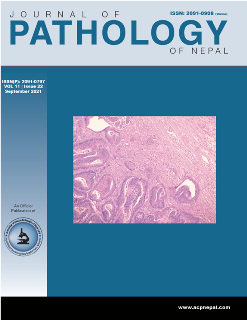Pathology in a digital realm: food for thought!
Keywords:
Digital pathologyAbstract
Digital Pathology, as defined by Digital Pathology Association is an image-based environment that enables the acquisition, management, and interpretation of information generated from a digitalized glass slide.1 The advent of fast and affordable whole slide scanners has aided in this paradigm shift from traditional to virtual microscopy. Its application includes primary diagnosis, telepathology, archiving, education, and research. Verification and validation studies with a high level of diagnostic concordance to light microscopy reassure its potential.2
The benefits comprise improved organization devoid of issues related to faded stains, broken and missing slides, efficient storage, accurate measurements of critical values, and rapid consultation with a shorter turnaround time.1 It supports in sustaining remote institutes facing a shortage of pathologists. Digitalization also creates opportunities for the application of artificial intelligence with the prospect of automating tasks such as counting mitosis, detecting lymph node metastasis, etc. Provided the algorithm and data are standardized, artificial intelligence can improve reproducibility and efficiency.3 The pathologists’ expertise combined with advances in digital pathology, including artificial intelligence can provide the best diagnostic accuracy.4 Major challenges are logistic, technological, and financial issues. Pathologists also need to overcome the emotional dependency on microscopes and hesitancy to adopt newer technology.
US FDA approval of the first digital system for primary diagnosis in surgical pathology was given in 2017 and this event provided the necessary momentum.5 The ongoing COVID-19 pandemic with consequent lockdown and social distancing has further augmented the usage of digital pathology worldwide and digital diagnostics proved to be an asset allowing remote working during this contagion crisis.6 Guidelines for safe implementation and quality assessment of digital pathology has been released by European countries to promote its active application.7
Despite the acceptance and advancement of digital pathology in developed nations, in our present context, it is still an overlooked concept. Only time will tell if the predictions of the future of pathology being digital are true. Nonetheless, we should ponder upon the relevance, advantages, limitations, and challenges of digital pathology in the Nepalese context, after all, “our thoughts are the beginning of everything we do”.
Downloads
Downloads
Published
How to Cite
Issue
Section
License
Copyright (c) 2022 Palzum Sherpa

This work is licensed under a Creative Commons Attribution 4.0 International License.
This license enables reusers to distribute, remix, adapt, and build upon the material in any medium or format, so long as attribution is given to the creator. The license allows for commercial use.




